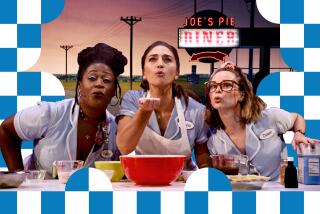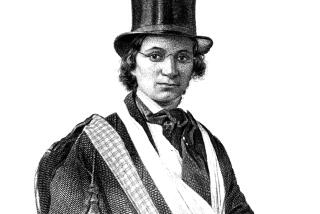A family’s legacy is served in multigenerational ‘Matilda’
- Share via
Novels featuring servants as protagonists have had a long literary history, including the title character of Samuel Richardson’s “Pamela” in 1740 and modern examples like Stevens, the major-domo in Kazuo Ishiguro’s 1989 novel “The Remains of the Day,” or Binh, fictional cook to Gertrude Stein and Alice B. Toklas in Monique Truong’s recent “The Book of Salt.” Thanks to these and other works, maids, butlers, cooks and other household staff usually glimpsed in the margins reveal themselves as complex characters who often illuminate the hypocrisy of those for whom they work or who mourn the vanishing social order that shaped their circumstances.
Stories of African Americans in service are less plentiful, perhaps because the origins of such service were in slavery or because of a natural reluctance for black writers to revisit situations fraught with painful or demeaning memories. More often than not, it has fallen to film and television to give voice to African Americans in service, although those voices are usually comedic -- think Hattie McDaniel’s dozens of maid, cook and mammy roles, Marla Gibbs’ Florence or Robert Guillaume’s Benson.
David Haynes’ latest novel, “The Full Matilda,” seeks to balance the record by recounting the story of the well-named Housewright family, which for more than 150 years ran the households of white industrialists, senators and socialites. But rather than shame or embarrassment about their subservient relationship to the rich and powerful, Matilda Housewright exhibits an almost haughty pride about her family’s chosen profession. Her first-person narrative punctuates the novel and gives voice to the dramas and disappointments that shaped six generations. From their lives, Matilda has gleaned the Housewright maxims, which range from the practical -- “Nothing marks a man slovenly more than a frayed shoelace” -- to those that can guide a life -- “you do what you have to do.”
While Matilda upholds unwavering principles of the past, brother Martin has returned from World War II with a radical plan. Patriarch Jacob has just died, and Martin sees the inheritance of worn dollar bills found in his home as his ticket to a new world as a caterer. But there’s a catch -- Jacob had extracted a promise from Martin to take care of his “Queenie,” which Matilda interprets as equal partnership in the catering business. It takes only one hilarious and disastrous venture undertaken by the siblings before Martin decides to go it alone in the business and Matilda, a monarch of a receding and increasingly irrelevant realm, retreats in anger to the home her father owned at the time of his death.
Prickly truce in place, the firm Martin establishes, Housewright and Sons, is run with fastidious attention to detail, even before there are male offspring to work in the business. Small wonder that when the boys, David and Roderick, are born, they too chafe under the weight of Housewright expectations. Ironically it is Martin’s nemesis Matilda who becomes the boys’ safe haven, even as she demands they adhere to the family’s exacting code.
As he explores these relationships, Haynes reveals how African Americans have responded to the forces shaping their lives in the last century. From Martin’s refusal to tolerate racist treatment from whites in the postwar ‘40s to the drugged-out drifting of his biracial grandson Jake in the ‘90s, each generation of Housewrights must come to terms with its legacy. And come to terms with Matilda, whose old-fashioned principles and startling sacrifices have also been a force in their lives, even though she sees herself as the literal embodiment of a line of poetry by John Milton: “They also serve who only stand and wait.”
A multigenerational saga such as “The Full Matilda” may seem a departure to readers who know Haynes’ comic novels “Live at Five” and “All American Dream Dolls,” which skewered the mores of local news reporters and the kiddie beauty pageant circuit. And in many scenes, “The Full Matilda” contains Haynes’ trademark sense of wicked humor. But the sensitive rendering of a lost world plus the depth of feeling revealed through the relationships of Matilda and the men in her life places “The Full Matilda” in a broader context that one hopes brings Haynes the critical acclaim he so richly deserves.
Paula L. Woods is the author of the Charlotte Justice series of detective novels, including “Dirty Laundry.”
More to Read
Sign up for our Book Club newsletter
Get the latest news, events and more from the Los Angeles Times Book Club, and help us get L.A. reading and talking.
You may occasionally receive promotional content from the Los Angeles Times.










